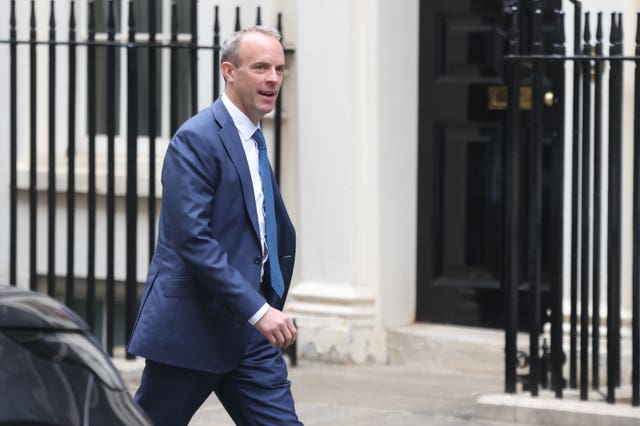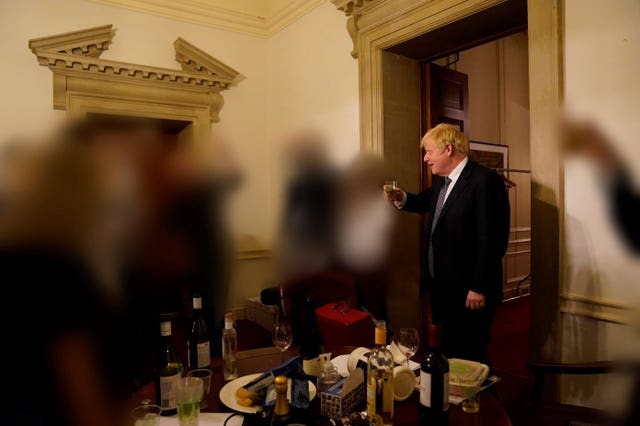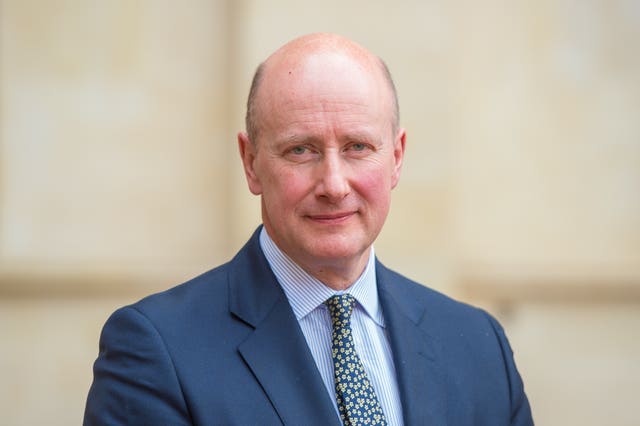
Deputy prime minister Dominic Raab has said questions around whether Boris Johnson broke the ministerial code “have been answered”, as he backed the PM’s assertion that he did not intend to break Covid laws.
The Justice Secretary also said he does not believe the Prime Minister will face a confidence vote next week, as the prospect of a leadership challenge loomed.
On Tuesday, Boris Johnson faced criticism from his ethics adviser over his handling of the partygate scandal, with Lord Geidt suggesting the PM’s fixed penalty notice (FPN) may have breached the ministerial code.
He said a “legitimate question” had arisen as to whether the FPN, issued for a June 2020 birthday party thrown in Mr Johnson’s honour in the Cabinet Room, might have constituted a breach of the “overarching duty within the ministerial code of complying with the law”.
Mr Johnson, in a letter released on Tuesday, said the fine “did not breach” the code as there was “no intent to break the law”.
 Deputy prime minister Dominic Raab (James Manning/PA)
Deputy prime minister Dominic Raab (James Manning/PA)
Mr Raab repeated this assertion during a round of interviews on Wednesday, saying the PM had been clear that his attendance at the birthday gathering was “inadvertent”.
Outlining why he believed Mr Johnson had not breached the code, he told Sky News: “Lord Geidt raised that issue and the PM has responded to the letter, and he’s been clear that in relation to the single fixed penalty notice he hadn’t intentionally broken the law, and his attendance at that gathering, as has been well rehearsed, was inadvertent.
“So Lord Geidt is really important, he is a senior figure. We’ve actually been working for months to reinforce his role, that’s been done by agreement between No 10 and Lord Geidt, but actually I think those questions have been answered, both in general but also now specifically in the letter the PM has sent and, as I said, we’re getting on with the job.”
He told Times Radio: “In relation to the single fixed penalty notice, it had been an unintentional breach of the law, and inadvertent in the sense that he turned up to the gathering without having realised it would be in breach of the relevant regulations.”
1922 Committee member Sir Geoffrey Clifton-Brown meanwhile said Conservative MPs need to consider which “crimes” Mr Johnson has “actually committed” before launching a leadership coup.
He told BBC Radio 4’s Today programme: “You’ve got to actually work out whether that new prime minister is actually going to be a positive asset to the country, compared to what you’ve got at the moment.
“As to what he’s actually committed, the crimes that he’s actually committed, and work out whether we should have a change or not.”
Sir Geoffrey said he wanted Mr Johnson to stay in position as “a man who knows how to handle crises”, citing his response to the war in Ukraine and the rising cost of living.
However, Sir Geoffrey added that “the situation is changing on a daily basis”.
Lord Geidt, the independent adviser on the ministerial code, also questioned the Prime Minister’s willingness to “take responsibility for his own conduct” in relation to the ministerial rules, and delivered a withering assessment of exchanges with Downing Street officials.
 Prime Minister Boris Johnson at a gathering in 10 Downing Street (Sue Gray Report/Cabinet Office/PA)
Prime Minister Boris Johnson at a gathering in 10 Downing Street (Sue Gray Report/Cabinet Office/PA)
In his response, Mr Johnson said he had taken “full responsibility for everything that took place on my watch” in light of lockdown-busting gatherings in Downing Street, and pointed to his House of Commons apology.
Amid suggestions Lord Geidt was considering his position over the handling of the issue, the Cabinet Office insisted he was not quitting.
Mr Raab said on Wednesday that he was “not privy to the conversation” on the matter.
But Lord Geidt appeared to hint at the prospect when, in his annual report, he noted he had attempted to avoid offering advice to Mr Johnson about his obligations under his own ministerial code.
He added: “If a Prime Minister’s judgment is that there is nothing to investigate or no case to answer, he would be bound to reject any such advice, thus forcing the resignation of the independent adviser.
“Such a circular process could only risk placing the ministerial code in a place of ridicule.”
The exchanges were made public after more Tory MPs openly called for Mr Johnson to quit in the wake of Sue Gray’s report on lockdown parties in Downing Street.
 Lord Geidt is the independent adviser on the ministerial code (Dominic Lipinski/PA)
Lord Geidt is the independent adviser on the ministerial code (Dominic Lipinski/PA)
There is growing belief at Westminster that it is only a matter of time before the 54 letters from Conservative MPs needed to trigger a confidence vote are submitted to the chairman of the 1922 Committee, Sir Graham Brady.
So far, more than 25 MPs have publicly called on the Prime Minister to stand down – although not all of them have said whether they have written to Sir Graham.
Mr Raab said he believes the number of letters submitted so far is “pretty far off” the amount needed to trigger a ballot, and he does not expect a vote to take place next week.
Speaking to Times Radio, he said: “First of all, you said that there were 30 MPs who have been public (in their criticism of the Prime Minister). There’s of course well over 350-odd Conservative MPs.”
Put to him that this is not far off 54, he said: “Well, if you’re at 30, which is what you’ve just said, I think you’re pretty far off, but my point is even then, in terms of the support for the PM, the overwhelming majority have not been public about these kind of criticisms.”
On the prospect of a confidence vote, he told Sky News: “I just don’t see that. I think the Westminster bubble and village whips this stuff up.”
He also said he thinks it is “very unlikely” that there will be an early election.


Comments: Our rules
We want our comments to be a lively and valuable part of our community - a place where readers can debate and engage with the most important local issues. The ability to comment on our stories is a privilege, not a right, however, and that privilege may be withdrawn if it is abused or misused.
Please report any comments that break our rules.
Read the rules here